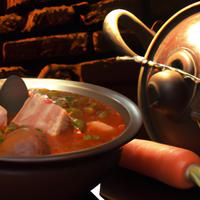
1 serving (250 grams) contains 50 calories, 2.0 grams of protein, 1.0 grams of fat, and 10.0 grams of carbohydrates.

Log this food in SnapCalorie

Nutrition Information
Calories |
48.1 | ||
|---|---|---|---|
% Daily Value* |
|||
| Total Fat | 1.0 g | 1% | |
| Saturated Fat | 0.2 g | 1% | |
| Polyunsaturated Fat | 0 g | ||
| Cholesterol | 0 mg | 0% | |
| Sodium | 480.8 mg | 20% | |
| Total Carbohydrates | 9.6 g | 3% | |
| Dietary Fiber | 1.9 g | 6% | |
| Sugars | 4.8 g | ||
| protein | 1.9 g | 3% | |
| Vitamin D | 0 mcg | 0% | |
| Calcium | 19.2 mg | 1% | |
| Iron | 0.5 mg | 2% | |
| Potassium | 192.3 mg | 4% | |
* Percent Daily Values are based on a 2,000 calorie diet. Your daily values may be higher or lower depending on your calorie needs.
Food Attributes
Source of Calories
About Barszcz
Barszcz, also known as borscht, is a traditional Eastern European soup with deep cultural roots, particularly in Polish, Ukrainian, and Russian cuisines. Its base is made from earthy beets, which give it a vibrant red-purple color and a slightly sweet, tangy flavor. Common ingredients include garlic, onions, carrots, and celery, with variations incorporating potatoes, meat, or beans. Often served with a dollop of sour cream and fresh dill, it can be enjoyed hot or cold. Barszcz is a nutritious, low-calorie dish packed with vitamins and minerals, including folate, manganese, and potassium, thanks to the beets and other vegetables. It's also a good source of antioxidants and fiber, supporting heart and digestive health. However, its sodium content can vary depending on preparation, so it's worth checking if watching salt intake. This warming, flavorful dish is both comforting and nourishing, making it a staple in traditional European diets.



